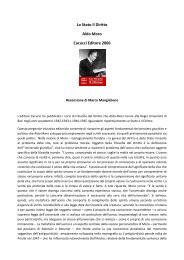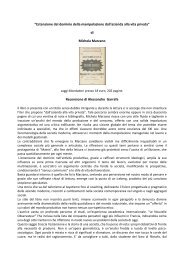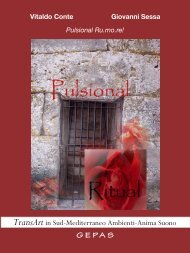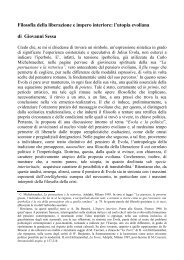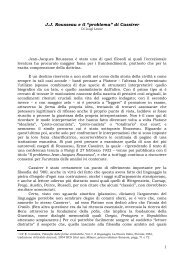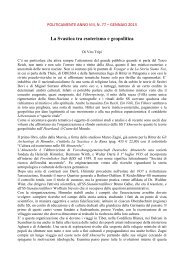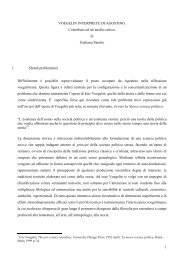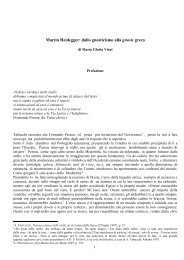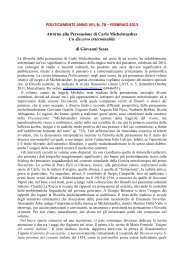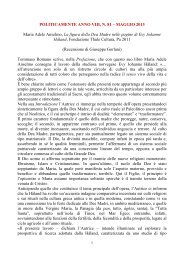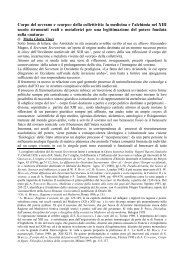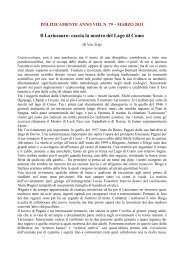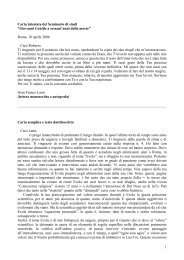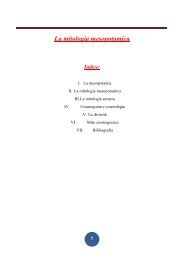Paolo Cevasco Przywara in Voegelin: un «flux of ... - PoliticaMente
Paolo Cevasco Przywara in Voegelin: un «flux of ... - PoliticaMente
Paolo Cevasco Przywara in Voegelin: un «flux of ... - PoliticaMente
Create successful ePaper yourself
Turn your PDF publications into a flip-book with our unique Google optimized e-Paper software.
Pag<strong>in</strong>a 8 di 9<br />
be played <strong>in</strong> <strong>un</strong>certa<strong>in</strong>ty <strong>of</strong> its mean<strong>in</strong>g, as an adventure <strong>of</strong> decision on the edge <strong>of</strong> freedom<br />
and necessity.» 23<br />
Il pensiero della creaturalità e della polarità che <strong>Przywara</strong> costruisce nei testi apparsi tra gli anni<br />
Venti e gli anni Trenta del '900 è con ogni probabilità operante <strong>in</strong> Voegel<strong>in</strong> sia molto prima che<br />
molto dopo il pur significativo riconoscimento tributatogli <strong>in</strong> Die politischen Religionen. Siamo <strong>in</strong><br />
grado a questo p<strong>un</strong>to di meglio apprezzare nella sua genesi la rilevanza che i nuclei del pensiero<br />
przywariano assumono <strong>in</strong> quest’opera di svolta, nella quale il concetto di Religion è messo a fuoco<br />
con queste parole:<br />
«Man experiences his existence as be<strong>in</strong>g natural (kreatürlich) and, therefore, questionable.<br />
Somewhere <strong>in</strong> his <strong>in</strong>nermost self, at the navel <strong>of</strong> his soul, at the place where his soul is<br />
l<strong>in</strong>ked to the cosmos, this question keeps tugg<strong>in</strong>g at him. (…) The large number <strong>of</strong><br />
f<strong>un</strong>damental possibilities and the <strong>in</strong>f<strong>in</strong>itude <strong>of</strong> historically concrete <strong>in</strong>stances that become<br />
apparent are l<strong>in</strong>ked with attempts at self-<strong>in</strong>terpretation, <strong>in</strong>clud<strong>in</strong>g all the mis<strong>un</strong>derstand<strong>in</strong>gs<br />
and misrepresentations aris<strong>in</strong>g <strong>in</strong> the course <strong>of</strong> this struggle to form an <strong>in</strong>exhaustible supply<br />
<strong>of</strong> experiences as well as rationalizations and systematizations <strong>of</strong> such experiences. For one<br />
the gates <strong>of</strong> existence stand wide open, grant<strong>in</strong>g a view <strong>of</strong> the levels <strong>of</strong> be<strong>in</strong>g that range<br />
from <strong>in</strong>animate nature to God; the world <strong>un</strong>folds itself to him, the rational relations between<br />
its contents become apparent, and they form and order <strong>of</strong> be<strong>in</strong>g <strong>in</strong> which the levels <strong>of</strong> be<strong>in</strong>g<br />
are classified <strong>in</strong> a hierarchy, and <strong>in</strong> response to the question as to the reason <strong>of</strong> be<strong>in</strong>g they<br />
form an order <strong>of</strong> creation. A maximum <strong>of</strong> absorption <strong>of</strong> reality is comb<strong>in</strong>ed with the<br />
maximum <strong>of</strong> rationality <strong>in</strong> the order and <strong>in</strong>terrelationship, and it is crowned by the perfect<br />
dogmatic development <strong>of</strong> the spiritual-religious experience <strong>in</strong> terms <strong>of</strong> an idea <strong>of</strong> God, such<br />
as that developed <strong>in</strong> the Occident <strong>in</strong> the analogia entis. For others, only scanty glimpses <strong>of</strong><br />
reality are granted, perhaps only one s<strong>in</strong>gle view: <strong>of</strong> nature, a great person, one’s people,<br />
mank<strong>in</strong>d – what such a person sees becomes the realissimum, the paramo<strong>un</strong>t reality; <strong>in</strong> fact,<br />
it takes the place <strong>of</strong> God and, thus, hides all else also, and above all, God.» 24<br />
Le esperienze “chiuse” e parziali del div<strong>in</strong>o co<strong>in</strong>cidono al millimetro con i quattro tipi<br />
dell’esperienza religiosa non equilibrati che <strong>Przywara</strong> ricavava <strong>in</strong> Religionsphilosophie katholischer<br />
Theologie dalle rotture della tensione del tripolo creaturale nell’elasticità trascendenza-immanenza.<br />
Questi tipi si producevano travolgendo, per eccesso o per difetto, l’<strong>in</strong>crocio equilibrato (Kreuz<strong>un</strong>g,<br />
che <strong>in</strong> <strong>Przywara</strong>, esegeta di Sant’Ignazio, mai dismette la propria pregnanza di simbolo ascetico) tra<br />
le due polarità dell’Io: trascendenza-immanenza (a livello trascendentale) e io-com<strong>un</strong>ità (a livello<br />
<strong>in</strong>dividual-concreto). Queste forme smisurate sono: tipo del sentimento dell’<strong>in</strong>f<strong>in</strong>ito, sfociante nella<br />
div<strong>in</strong>izzazione della natura; tipo della trascendenza oggettivata, sfociante nella div<strong>in</strong>izzazione<br />
dell’idealismo culturale; tipo della trascendentalità, sfociante nel culto di <strong>un</strong>’umanità soggetto di <strong>un</strong><br />
progresso assolutizzato; tipo dell'assolutizzazione dell’esperienza <strong>in</strong>dividuale, sfociante nel culto<br />
dell’<strong>in</strong>dividualità eroica 25 . Anche Voegel<strong>in</strong> contrappone alle esperienze parziali del div<strong>in</strong>o il<br />
raggi<strong>un</strong>to equilibrio e la completezza ord<strong>in</strong>ata dell’analogia entis: proprio la formula tommasiana, e<br />
poi scolastica, che <strong>Przywara</strong> aveva eretto ad <strong>in</strong>segna della sua filos<strong>of</strong>ia polare.<br />
23<br />
E. Voegel<strong>in</strong>, <strong>in</strong> CW, vol. 14 Order and History. I. Israel and the Revelation, University <strong>of</strong> Missouri Press, Baton Rouge<br />
2001, p. 39.<br />
24<br />
E. Voegel<strong>in</strong>, The political religions, <strong>in</strong> CW, vol. 5 Modernity without restra<strong>in</strong>t, University <strong>of</strong> Missouri Press, Columbia and<br />
London, 2000, p. 30 e pp. 31-32. Segnaliamo soltanto l’<strong>in</strong>volontario ma non per questo meno pr<strong>of</strong>ondo effetto d’<strong>in</strong>ganno che<br />
scaturisce dalla traduzione del przywariano e patristico kreatürlich con il term<strong>in</strong>e natural, per certi versi opposto, se si pensa alla<br />
nozione di natura nelle scienze dette “naturali”.<br />
25<br />
E. <strong>Przywara</strong>, Religionsphilosophie katholischer Theologie, <strong>in</strong> Handbuch der Philosophie, Oldenbourg, München <strong>un</strong>d Berl<strong>in</strong><br />
1925. Cito da Id., Schriften, IIes Band Religionsphilosophische Schriften, Johannes Verlag, E<strong>in</strong>siedeln 1962, pp. 389-393, <strong>in</strong> <strong>un</strong><br />
paragrafo <strong>in</strong>titolato significativamente “Religion vom Bewußtse<strong>in</strong> des konkreten Ich aus” [“Religione a partire dalla coscienza<br />
dell’Io concreto”]. Storicamente è <strong>in</strong>teressante che a questo Handbuch der Philosophie abbiano collaborato anche altre auctoritates<br />
di sicuro <strong>in</strong>flusso su Voegel<strong>in</strong>, come Alois Dempf, e addirittura il suo <strong>in</strong>fluente maestro Othmar Spann.



